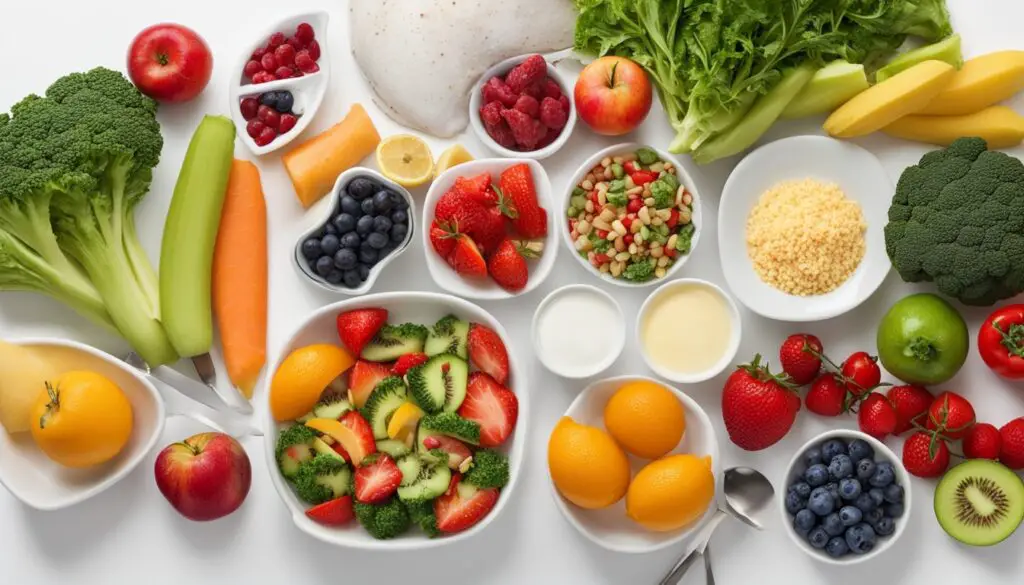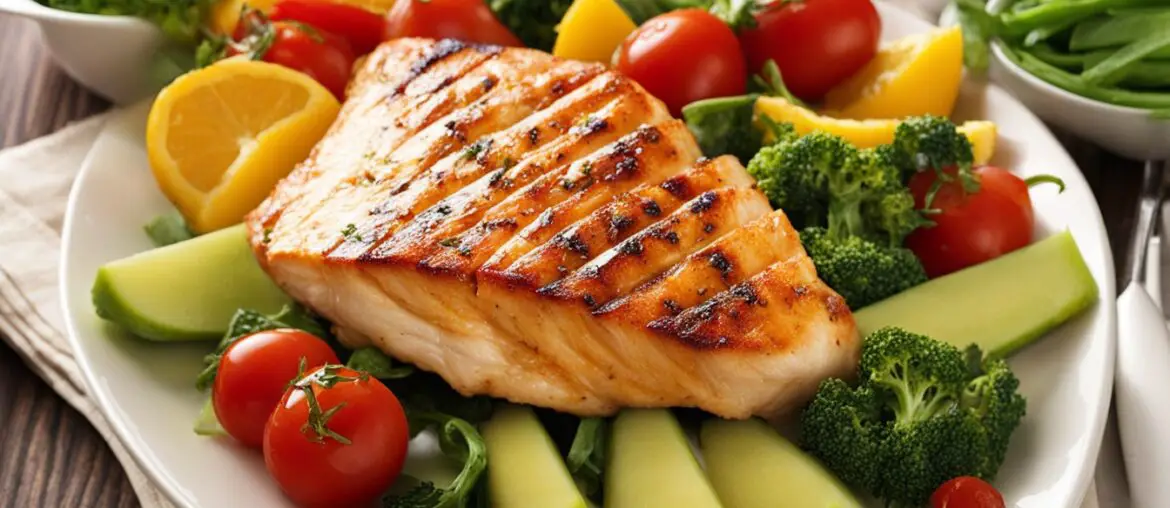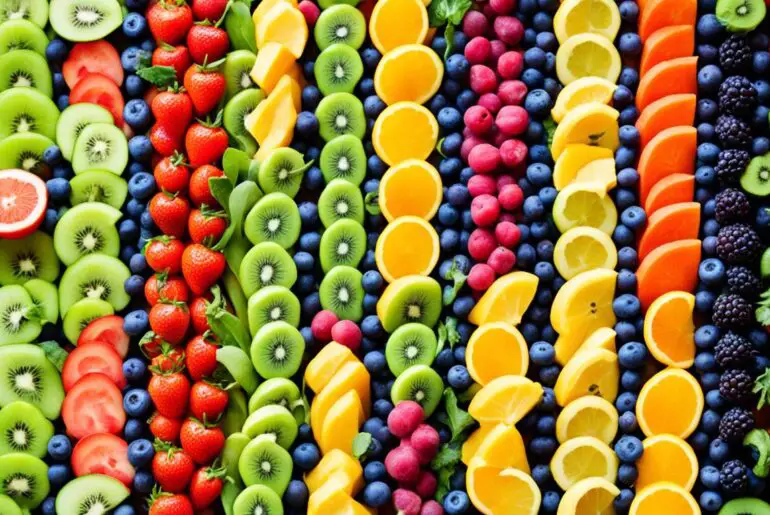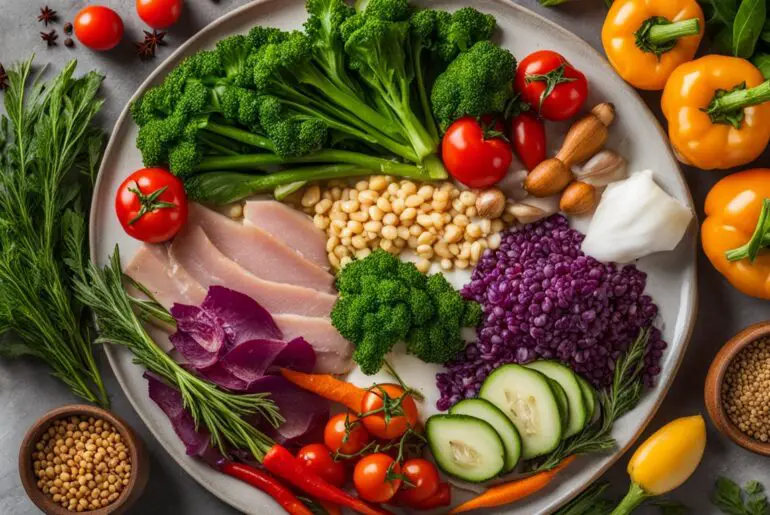Did you know that the HCG diet, a controversial weight loss plan, combines the use of the hormone HCG with an extremely low-calorie diet? This diet restricts daily calorie intake to just 500-800 calories and has gained popularity for its promise of rapid weight loss. However, before embarking on the HCG diet, it is important to understand the nutritional advice and guidelines to ensure safe and effective weight loss.
The HCG diet consists of three main phases: the loading phase, the weight loss phase, and the maintenance phase. During the weight loss phase, individuals are limited to a strict menu primarily consisting of lean proteins, vegetables, fruits, and limited carbohydrates. While some people may experience significant weight loss on the HCG diet, it is important to note that health experts do not recognize it as a safe or effective approach.
It is essential to consult with a healthcare provider or registered dietitian before starting the HCG diet or any other restrictive eating plan. They can provide personalized advice and guidance to ensure you are meeting your nutritional needs while promoting sustainable weight loss.
Key Takeaways:
- The HCG diet combines the hormone HCG with a low-calorie diet for rapid weight loss.
- The diet has three phases: loading, weight loss, and maintenance.
- During the weight loss phase, individuals consume only 500-800 calories per day.
- It is important to consult with a healthcare provider before starting the HCG diet.
- Nutritional advice and guidance are crucial for maintaining weight loss after completing the HCG diet.
Understanding the HCG Hormone
The HCG hormone, also known as human chorionic gonadotropin, plays a vital role in early pregnancy. It is produced by the placenta and helps maintain the production of progesterone, which is essential for a healthy pregnancy.
Human chorionic gonadotropin (HCG) is commonly used as a marker in home pregnancy tests, as its presence indicates pregnancy. A rise in HCG levels can be detected as early as 11 days after conception.
Aside from its role in pregnancy, HCG has also been utilized to address fertility issues. In certain cases, doctors may prescribe HCG injections to promote ovulation in women or increase testosterone levels in men with hormonal imbalances.
In 1954, British doctor Albert Simeons proposed an alternative use for HCG: as a weight loss aid. Simeons believed that HCG, when combined with a very low-calorie diet, could help individuals achieve rapid weight loss.
Today, you can find various forms of HCG products on the market. These include oral drops, pellets, and sprays. The most well-known application of HCG for weight loss is the hCG diet.
The hCG diet involves the administration of HCG alongside a highly restricted, low-calorie intake. The combination is expected to promote weight loss by suppressing hunger and enhancing metabolic function.
Despite its popularity, it is important to note that the hCG diet is not without controversy. Health experts have expressed concerns about the safety and effectiveness of the diet, as well as the potential risks associated with severe calorie restriction.
The Science behind the HCG Diet
Proponents of the HCG diet claim it boosts metabolism and leads to significant fat loss without hunger. However, multiple studies have concluded that weight loss on the HCG diet is primarily due to the drastic calorie restriction, not the HCG hormone. Studies comparing HCG injections with placebo injections on a calorie-restricted diet have shown no significant difference in weight loss between the two groups.
Additionally, there is no scientific evidence to support the claims that HCG prevents muscle loss or enhances metabolism.
While some individuals may experience rapid weight loss on the HCG diet, it is important to note that this is primarily due to the severe calorie restriction rather than any unique effect of HCG. The HCG hormone itself does not directly contribute to weight loss or alter metabolic processes.
It is essential to approach any weight loss plan, including the HCG diet, with caution and consult with a healthcare provider before starting. They can provide individualized guidance based on your specific needs and goals.
The HCG Diet Phases
The HCG diet consists of three distinct phases that are designed to facilitate successful weight loss and maintenance. These phases are known as the loading phase, the weight loss phase, and the maintenance phase. Each phase serves a specific purpose and plays a crucial role in the overall effectiveness of the HCG diet.
The Loading Phase
The loading phase is the initial stage of the HCG diet and typically lasts for two days. During this phase, individuals are encouraged to indulge in high-fat, high-calorie foods. The purpose of this phase is to prepare the body for the subsequent phases by building up fat stores. At the same time, HCG supplements are taken to begin the process of regulating metabolism.
During the loading phase, it’s important to remember that these indulgences are temporary and a necessary component of the diet plan. The goal is to provide the body with enough calories and fat to effectively transition into the weight loss phase.
The Weight Loss Phase
The weight loss phase is the main component of the HCG diet and typically lasts for 3-6 weeks, depending on individual weight loss goals. This phase involves strict calorie restriction, with individuals consuming only 500-800 calories per day. The low-calorie intake is supplemented with HCG injections or drops to help regulate hunger and metabolism.
During the weight loss phase, it’s important to focus on consuming lean proteins, vegetables, fruits, and limited carbohydrates. These food choices help promote fat burning and optimize weight loss.
The Maintenance Phase
After completing the weight loss phase, individuals transition into the maintenance phase. This phase lasts for three weeks and involves gradually increasing calorie intake while avoiding sugar and starch. The goal of the maintenance phase is to stabilize weight loss and establish long-term healthy eating habits.
During the maintenance phase, it’s crucial to monitor portion sizes and make mindful food choices to prevent weight regain. This phase sets the foundation for maintaining weight loss achieved during the HCG diet.
The HCG diet phases provide a structured approach to weight loss and maintenance. By following these phases, individuals can effectively manage their calorie intake, optimize their metabolism, and achieve their desired weight loss goals.
HCG Diet Meal Plan

The HCG diet meal plan during the weight loss phase is highly restrictive. It is important to follow specific guidelines and restrictions to achieve optimal results. The meal plan typically includes two meals per day, usually lunch and dinner. Each meal should consist of carefully selected foods that are approved for the HCG diet.
HCG Diet Approved Foods
The HCG diet approved foods include:
- Lean protein sources: such as chicken breast, turkey, white fish, shrimp, or lean cuts of beef
- Vegetables: low-carbohydrate options like spinach, lettuce, cucumber, tomatoes, asparagus, or broccoli
- Bread or breadstick: a small portion to accompany your meal
- Fruits: a serving of fresh fruits, such as apples, oranges, strawberries, or grapefruit
It is essential to avoid certain foods that are not allowed on the HCG diet. These include butter, oils, and sugar. The emphasis is on consuming whole, nutrient-dense foods that are low in calories but provide essential vitamins and minerals.
HCG Diet Meal Restrictions
The HCG diet imposes specific meal restrictions to ensure optimal weight loss. To achieve the desired results, it is important to:
- Avoid foods high in fat and carbohydrates, such as fried foods, processed snacks, and sugary desserts
- Avoid added oils or dressings when preparing meals
- Avoid beverages that contain calories, including soda, sweetened drinks, and alcohol. Drinking plenty of water is encouraged
By strictly adhering to the approved foods and meal restrictions, individuals on the HCG diet can optimize their weight loss results. It is important to consult with a healthcare provider or registered dietitian before starting the HCG diet or any other restrictive eating plan to ensure safety and suitability for individual needs.
Safety and Side Effects of the HCG Diet
The HCG diet has gained popularity as a weight loss method, but it is important to understand the potential safety concerns and side effects associated with this diet.
Firstly, it is crucial to note that the HCG diet has not been approved by the FDA as a weight loss aid. The FDA has issued warnings about the safety of HCG products, as they remain unregulated and may contain unknown ingredients.
“The HCG diet is considered unsafe and has not been approved by the FDA as a weight loss aid.”
When considering the HCG diet, it is essential to be aware of the potential side effects. These can include headaches, fatigue, depression, and even potential blood clots. The severe calorie restriction that accompanies the diet can also lead to nutrient deficiencies and other health risks.
It is crucial to discuss any weight loss plan, including the HCG diet, with a healthcare provider before starting. They can provide guidance on safe and effective alternatives and assess the potential risks based on an individual’s specific health profile. Seeking professional advice ensures that you make informed decisions about your health and well-being.
Remember, prioritizing your health should always come first, and there are many other safe and effective weight loss methods available that can help you achieve your goals without compromising your well-being.
Scam Products on the Market

When searching for HCG products for your weight loss journey, it is important to be aware of the prevalence of scam products on the market. Many of these products claim to be homeopathic HCG, but in reality, they do not contain any real HCG hormone.
Legitimate HCG injections, which are used as a fertility drug or hormone treatment, are only available with a prescription. Over-the-counter HCG products have been deemed illegal by the FDA, and companies selling these products are breaking the law.
It is crucial to exercise caution when purchasing HCG products and to consult with a healthcare provider for legitimate options. Ensure you are obtaining genuine HCG products for your weight loss journey to ensure safety and effectiveness.
| Signs of HCG diet scam products | How to find legitimate HCG products |
|---|---|
|
|
Protect yourself from illegal HCG products and avoid falling victim to scams by being well-informed and seeking guidance from reliable sources. Your weight loss journey should be supported by safe and effective methods recommended by healthcare professionals.
Effective and Safe Weight Loss Methods
When it comes to weight loss, it’s important to prioritize methods that are not only effective but also safe and sustainable. While the HCG diet may be popular for its potential for rapid weight loss, there are alternative approaches that are more sensible and supported by healthcare professionals.
“It’s always best to focus on long-term, sustainable weight loss instead of quick fixes or fad diets like the HCG diet,” says Dr. Emily Sanders, a renowned nutritionist. “A balanced diet and regular physical activity are key components of a successful weight loss journey.”
The first step towards safe weight loss is following a balanced and nutritious diet. This means consuming a variety of fruits, vegetables, lean proteins, whole grains, and healthy fats. Avoiding highly processed foods, sugary drinks, and excessive calorie intake is crucial for achieving weight loss goals.
Additionally, engaging in regular physical activity is essential for maintaining a healthy weight and overall well-being. Incorporating exercises such as cardio, strength training, and flexibility exercises into your routine can help burn calories, build muscle, and boost metabolism.
Seeking guidance from healthcare professionals, such as doctors, dietitians, or nutritionists, is highly beneficial when embarking on a weight loss journey. These experts can provide personalized recommendations and develop healthy weight loss plans based on individual needs and goals.
Key Recommendations for Safe Weight Loss:
- Follow a balanced diet consisting of fruits, vegetables, lean proteins, whole grains, and healthy fats.
- Avoid highly processed foods, sugary drinks, and excessive calorie intake.
- Incorporate regular physical activity into your routine, including cardio, strength training, and flexibility exercises.
- Consult with healthcare professionals, such as doctors, dietitians, or nutritionists, for personalized guidance and support.
By adopting these safe and effective weight loss methods, you can achieve long-term success and maintain a healthy weight without compromising your overall health.
Conclusion

After completing the HCG diet, it is crucial to prioritize your long-term weight management and overall health. While the diet may result in rapid weight loss, it is not considered safe or sustainable by health experts. The severe calorie restriction and lack of essential nutrients can lead to nutrient deficiencies and other health risks.
To ensure your well-being and maintain weight loss after the HCG diet, it is recommended to seek guidance from healthcare professionals. They can provide expert nutritional advice tailored to your needs and goals. They can also help you develop a balanced and healthy eating plan that suits your lifestyle and preferences.
Incorporating regular physical activity into your routine is another important aspect of maintaining weight loss. Engaging in exercises that you enjoy, such as walking, jogging, cycling, or strength training, can help you burn calories, build muscle, and boost your overall well-being.
Remember, sustainable weight loss is a gradual process that involves making healthy lifestyle changes. It is not about quick fixes or extreme dieting. By adopting a balanced and nutritious eating plan, engaging in regular physical activity, and seeking professional guidance, you can achieve and maintain your weight loss goals in a safe and sustainable manner.
| Key Tips for Nutritional Advice after HCG Diet |
|---|
| 1. Consult with a healthcare professional for personalized nutritional advice. |
| 2. Follow a balanced and healthy eating plan that includes a variety of nutrient-dense foods. |
| 3. Avoid extreme dietary restrictions and focus on sustainable weight loss methods. |
| 4. Engage in regular physical activity that you enjoy. |
By implementing these strategies, you can maintain your weight loss after the HCG diet and continue on your journey towards a healthier and happier life.

While the HCG diet has faced criticism and controversy, some individuals have reported successful weight loss results. Here are a few real-life success stories from individuals who have tried the HCG diet:
“I lost 20 pounds in just four weeks on the HCG diet. It was tough, but the rapid weight loss kept me motivated to stick with it. I learned a lot about portion control and making healthier food choices.”
“After struggling with my weight for years, I decided to give the HCG diet a try. I lost 30 pounds in two months and have been able to maintain my weight loss since then. It was a challenging journey, but it gave me the kick-start I needed to develop healthier habits.”
“I was skeptical about the HCG diet at first, but I decided to give it a shot. To my surprise, I lost 15 pounds in just three weeks. The diet helped me break my unhealthy eating patterns and taught me the importance of balanced meals and portion control.”
These success stories highlight the potential for weight loss on the HCG diet. However, it’s important to remember that individual results may vary, and the diet’s safety and effectiveness are still debated among experts.
Consulting a healthcare provider or registered dietitian is crucial before embarking on any weight loss plan, including the HCG diet. They can provide personalized guidance, evaluate your health status, and recommend safe and sustainable weight loss methods.
| Name | Weight Loss | Duration |
|---|---|---|
| Laura S. | 20 pounds | 4 weeks |
| Mark D. | 30 pounds | 2 months |
| Sarah M. | 15 pounds | 3 weeks |
Section 12
Conclusion
After evaluating the HCG diet, it becomes apparent that while it may result in rapid weight loss, it is not a safe or sustainable approach to long-term weight management. The severe calorie restriction and lack of essential nutrients in this controversial diet can lead to nutrient deficiencies and other health risks.
To achieve lasting weight loss, it is crucial to focus on long-term, sustainable methods that involve a balanced diet and regular physical activity. Instead of following restrictive diets like the HCG diet, seeking guidance from healthcare professionals can provide personalized nutritional advice for maintaining weight loss after completing the HCG diet.
Nutritional advice after the HCG diet should emphasize a well-rounded eating plan that incorporates a variety of nutrient-dense foods. A balanced approach to nutrition can help ensure that the body receives all the necessary vitamins, minerals, and macronutrients for optimal health.
In addition to a balanced diet, regular physical activity is also essential for maintaining weight loss. Engaging in activities that you enjoy and finding ways to incorporate exercise into your daily routine can support a healthy lifestyle and help prevent weight regain.
FAQ
What is the HCG diet?
The HCG diet is a weight loss plan that combines the use of the hormone HCG with an extremely low-calorie diet.
What are the phases of the HCG diet?
The HCG diet consists of three phases: the loading phase, the weight loss phase, and the maintenance phase.
What foods are allowed on the HCG diet?
The HCG diet allows lean proteins, vegetables, fruits, and limited carbohydrates.
Is the HCG diet safe and effective?
The HCG diet is not recognized as safe or effective by health experts.
What are the potential side effects of the HCG diet?
Side effects of the HCG diet may include headaches, fatigue, depression, and potential blood clots.
Are over-the-counter HCG products legal?
Over-the-counter HCG products are considered illegal by the FDA.
What are some effective and safe weight loss methods?
Effective and safe weight loss methods include following a balanced diet and engaging in regular physical activity.
How can I maintain weight loss after the HCG diet?
Maintaining weight loss after the HCG diet involves adopting a balanced and healthy eating plan and engaging in regular physical activity.




